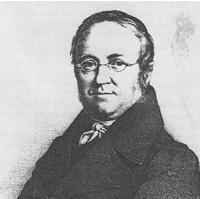Planning worship?
Check out our sister site, ZeteoSearch.org,
for 20+ additional resources related to your search.
- |
User Links
Person Results
Johann Georg Frech

1790 - 1864 Person Name: Johann Georg Frech, 1790-1864 Composer of "ASPURG" in The Irish Presbyterian Hymnbook Johann Georg Frech (* January 17 1790 in Kaltental, † August 23 1864 in Esslingen am Neckar ) was a German music director, composer and organist.
Naughty was the son of a watchmaker and organ builder. He visited here until his 13th Age of the school, then high school in Stuttgart and took lessons in music.
In 1806 he was teaching assistant in Degerloch while still in Stuttgart, studied music. In 1811 he went as a teaching assistant after Esslingen and in 1812 a music teacher at the newly established Esslinger teacher seminar. In 1820 he received the office of a municipal director of music and organist at the main church in Esslingen, where he remained until his retirement in 1860. His successor was Christian Fink.
Naughty took a significant role in the Württemberg church singing together with Konrad Kocher and Friedrich Silcherstraße one. Together with the aforementioned He created "The Württemberg Choral Book" of 1828 and was co-editor of "Württemberg Choral Book" of 1844.
Frech has composed six symphonies, many choral works, including 22 chorales for Württembergischen chorale books, 67 cantatas, an opera, the oratorio "Abraham on Moriah" and some organ works.
In the district of Stuttgart Kaltental a street was named after naughty.
--de.wikipedia.org/wiki/
Johann Georg Frech
Thomas Dupuis
1733 - 1796 Person Name: T. S. Dupuis Composer of "CHANT" in The Presbyterian Book of Praise
Thomas Dupuis
Thomas Clark
1775 - 1859 Composer of "CREDITON" in The Presbyterian Book of Praise
Baptized: February 5, 1775, Canterbury, Kent, England.
Died: May 30, 1859, at his home in St. George’s Street, Canterbury, Kent, England.
A cobbler and choir trainer, Clark led the singing of the Psalms at the Wesleyan Chapel, Canterbury, and later at the Unitarian Church in Canterbury. It has been claimed he never actually joined the Unitarians, though he sympathized with them, and he resigned from the Methodists. Clark wrote a number of anthems, including "Awake Up, My Glory", "Daughter of Zion" and "Since I Have Placed My Trust." His other works include:
First Sett of Psalm and Hymn Tunes, 1805
Second Sett of Psalm and Hymn Tunes, circa 1810
Congregational Harmonist, 4 volumes (1828 to circa 1835)
The Sacred Gleaner, 1830
The Union Tune-Book, 1837 (co-editor)
Union Harmonist, 1841
Harmonized the second edition of the Union Tune Book for the Sunday School Union, 1842
The Juvenile Harmonist, 1842
David’s Harp—A Series of Original Tunes Composed Expressly to the Psalter, 1843
The Seraphim or Sacred Harmonist, 1843
British Psalmody, with Alexander Hume (Edinburgh, Scotland: 1844)
--www.hymntime.com/tch/
Thomas Clark


 My Starred Hymns
My Starred Hymns


